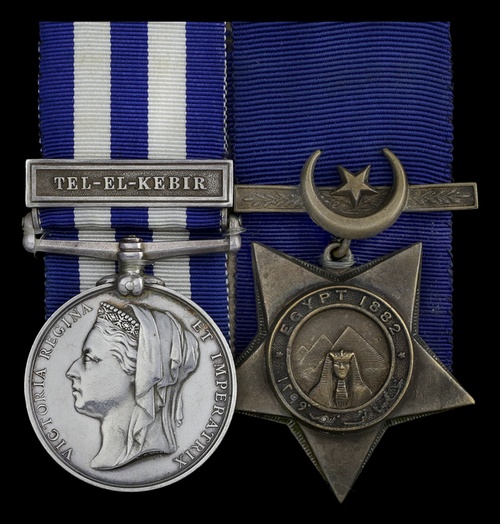
Auction: 19002 - Orders, Decorations and Medals
Lot: 91
(x) Pair: Brigade-Surgeon T. C. Tolmie, Army Medical Department, late King's Royal Rifle Corps and 92nd (Gordon Highlanders) Regiment, who was fortunate to survive the explosion of an ammunition train at Cairo railway station in September 1882; one soldier died whilst five, including Tolmie, were wounded
Egypt and Sudan 1882-89, dated reverse, 1 clasp, Tel-El-Kebir (Surgn. Maj: T. C. Tolmie. A.M. Dept.); Khedive's Star 1882, unnamed as issued, good very fine (2)
Thomas Campbell Tolmie was born on 9 July 1839 at Dalnamine, Scotland, and educated at Glasgow University. Qualifying as a Licentiate of the Faculty of Physicians and Surgeons in 1861, he became a Licentiate of the Royal College of Physicians at Edinburgh in 1866.
Appointed Staff Assistant Surgeon on 1 April 1867, Tolmie was transferred to the 92nd Regiment on 12 October 1867, being promoted Surgeon on 1 March 1873 and served briefly on the Staff, Bengal. Later witnessing home service at Manchester from June 1874, Birmingham 1875-76, and Sunderland 1877, he arrived in Malta from Scarborough on 18 December 1877. Promoted Surgeon-Major, Tolmie travelled on leave back and forth between England and Malta until selected to proceed on active service with the Egyptian Expeditionary Force on 7 July 1882.
The Explosion at Cairo Station: Surprised by a 'new' Enemy
The events of 4.00 p.m. that afternoon are best described by a telegraph from the Daily News correspondent at Cairo who witnessed the chaos unfurl on 28 September 1882:
'Rushing out (of the hotel) I saw a dense volume of smoke filling the air, proceeding from the direction of the railway station. The 3rd Battalion of the 60th Rifles had just arrived for the review, had passed the ammunition train on the left, a few yards outside the station, and had scarcely drawn up on the platform when several wagons of the train blew up.'
The initial explosion was followed by others as shells and gunpowder increased the violence and enveloped the woodwork of the carriages in flames. Arrangements were at once made to place a cordon of troops around the burning station and to pull down such portions of the building as, when cleared away, would break the course of the fire, but whilst military discipline remained resolute, the same could not be said of the local population:
'When the crowds realised the danger of the event they streamed away in a style resembled what one has seen in pictures of cattle and horses stampeding before prairies on fire. The whole atmosphere, even in the Esbekieh quarter, is black as pitch, and at the bridge near the station it is almost impossible to breathe. I have passed numbers of the inhabitants rushing out with children in their arms, and their money and other portables, under the impression that Cairo has been surprised by a new enemy' (The Northampton Mercury, refers.)
According to The Campaign of 1882 in Egypt, the explosion was entirely accidental. It was occasioned by the shunting of wagons in which there was Egyptian ammunition and a considerable number of percussion shells, one of which must have exploded from the shock of the movement. The initial explosion was further facilitated by a day of exceptional and extreme heat under the influence of the Khamseen wind, and exacerbated by the poor quality of the water-engines.
The show must go on!
Despite the disaster, which contemporary sources note also killed a number of local men, the Grand Parade took place before the Khedive on 30 September 1882 with considerable success; no mere question of show or holiday spectacle, it is hardly possible to imagine a sight more calculated to impress an Eastern population than the display of the various arms of the little force, especially the march past of the Indian troops, representative of the many and various Eastern races who contributed to the might of Her Majesty's Empire.
For Tolmie and the men of the 60th Rifles, the reality was very different. Likely suffering from burns and smoke inhalation, Tolmie's campaign was over almost as soon as it had begun, together with that of Staff Sergeants W. H. Bate, E. Sainsbury and T. White, and Privates P. Brogan and G. Pope (Egypt 1882, Dispatches, Casualties, Awards, refers). Having survived the fire, the unit also began to suffer from a considerable amount of fever, dysentery and some opthalmia, no doubt caused by the filthy condition of the Cairo barracks and subsequent forced encampment on the Island of Bulak - a dusty plain, presenting many discomforts - and the desert near Abbassiyeh.
Having recovered, Tolmie later served in the Sudan as secretary to the Principal Medical Officer to the Frontier Field Force from 1885-86 and was present in the action at Giniss. In August 1886, he moved from Egypt to Woolwich and was granted retired pay with the honorary rank of Brigade-Surgeon on 3 August 1887. He died at 46 Ashurst Road, North Finchley, on 12 May 1919; sold with extensive copied research and obituary from the British Medical Journal.
Subject to 5% tax on Hammer Price in addition to 20% VAT on Buyer’s Premium.
Sold for
£650
Starting price
£280




